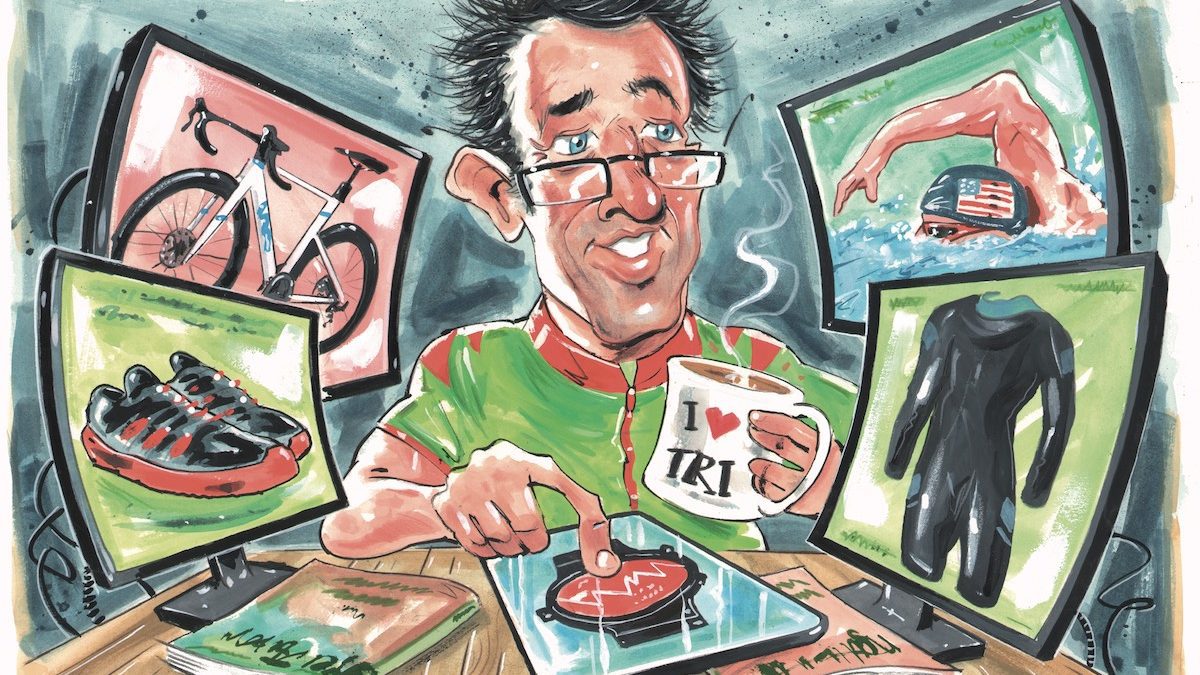Obsessing about triathlon all the time is a good thing. Really
Have our triathlon habits provided some much-needed resilience over the last two years?
 Photo by:
Russ Tudor
Photo by:
Russ Tudor
It is 5:37 a.m. and I am plunked down on the couch, staring at my phone and drinking in one more Caeleb Dressel swim video.
I am also drinking a wake-me-up double espresso.
“49:28,” yells an announcer. “A new IM world record.”
Rock music blares, lights flash, excited American swimmers smash their arms into the water.
Then a relaxed Caeleb comes on screen from what looks like his bedroom, a pair of black swim trunks framed on the wall over his right shoulder.
“Hi guys. Sorry to keep everyone waiting for so long,” he says. The 25-year-old Olympic champion proves to be every bit as articulate as he is fast. He spends 12 minutes dissecting his race, “shredding it to bits,” stroke by stroke.
“Watch this,” he says as he replays his start. “Your boy wasn’t fresh: just look at the splash coming off my feet right there.”
I am hanging on to this dude’s every word.
“Oh, that turn was really bad,” he says. “I was really spinning here.” He’s talking tempo, he’s talking stroke count, he’s talking the angle his fingertips slide into the water.
I make another coffee.
Outside my window, an industrial plow sprays tonnes of snow into a dump truck, a runner wearing a headlamp leaps over a snowbank, and a neighbour tugs his poodle’s leash to stop the dog from eating garbage.
Related: How triathlon training and racing prepared this triathlete for cancer surgery
Back on the couch, I reach for “Why Do They Swim-Bike-Run So Fast,” an article I ripped out of the New York Times.
“The most advanced science in the triathlon world can be found in Norway, where athletes embrace the data found in heat sensors, oxygen measuring masks and their feces,” reads the subtitle.
6:27 a.m. and I am getting my second hit of the morning, reading how Olympic champion Kristian Blummenfelt takes his own blood to measure lactate levels, drinks $2,500 bottles of an Oxygen isotope-infused water to measure his oxygen efficiency and – wait for it – fishes his own stool out of the toilet so that his coach can burn it to measure how he’s metabolizing carbohydrates.
“My name is David, and I am a 65-year-old triathlete who spends as much time reading about swim-bike-run as I train to do them. I am an addict.”
I catch myself reading online reviews on the treads and rolling resistance of tubeless racing tires. But I use clinchers.
I own a good wetsuit, yet I dive into articles about the latest neoprene tweaks, seam glues and shoulder motion advantages in this year’s models.
My decade-old Cervelo P2 is much-ridden, much-loved and much tuned up, yet I comb through the wind tunnel analyses of the aero advantages of a BMC Time Machine TM01 compared to a Specialized S Works Shiv, a Felt IA FRD, a Canyon Speedmax CF SLX 9.0 Pro.
I am loyal to my ride and my Blue Seventy wetsuit, so why am I so drawn to having these illicit affairs?
7:10 a.m. and a ping from my inbox.
An article from the science magazine Nature: “How the Covid-19 Pandemic Might Age Us.”
Related: Mental cues for nailing your training
It’s a fascinating, deep look at how scientists are looking at the multitude of factors that can cause what is called Accelerated Aging, which seems to be happening more during the pandemic, “exacerbating health conditions and shortening lives.”
How we age is affected by genes, exposure to infections, drugs, eating and exercise habits and, more and more studies show, stress, social isolation and loneliness.
So, given the terrible consequences of the worldwide pandemic, how come some people seem to be doing OK?
“People can experience the exact same trauma and have very different outcomes.” says Laura Fonken, a neuroscientist at the University of Texas at Austin. “What makes these people so resilient?”
Scientists in all kinds of fields, from neurology to psychology to genetics, are doing their best to come up with answers.
No one expects them to be simple.
We are triathletes. Exercising and eating well are part of who we are.
So is dreaming, and planning, and mentally preparing for our training and races. We sweat, we suffer, we hurt, we smile, we win, we fail, we fall into bed tired and get up and do it all over again.
So maybe my addiction to those Caeleb Dressel videos and bike porn and geeky behind-the-scenes looks at how Olympic champions find ways of being Citius, Altius, Fortius isn’t really wasted time after all. Maybe it’s just a kind of meditating, which, according to everyone from Buddhists like Pema Chodron and the late Thich Nhat Han to scientists in that Nature article, can help you through tough times. It’s practising resilience.
Time to get off the couch and walk the dog.
My wife and I are heading to the McGill pool for 9:15. COVID rules are two per lane, and today I am working on my body position.
Caeleb says he keeps his head tilted slightly forward so he’s looking ahead, not straight down.
I am going to give it my best shot.
David Gutnick is a retired CBC journalist and avid triathlete from Montreal. This story originally appeared in the March, 2022 issue of Triathlon Magazine Canada.
